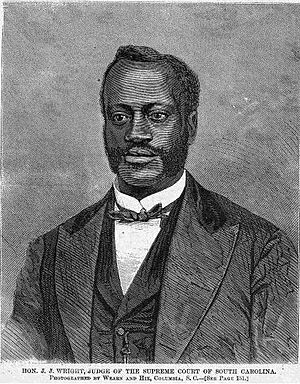Jonathan Jasper Wright facts for kids
Quick facts for kids
Jonathan Jasper Wright
|
|
|---|---|

Jonathan Jasper Wright (c. 1870)
|
|
| Associate Justice of the South Carolina Supreme Court | |
| In office January 30, 1870 – December 1, 1877 |
|
| Preceded by | Solomon L. Hoge |
| Succeeded by | Alexander Cheves Haskell |
| Member of the South Carolina Senate from Beaufort County |
|
| In office November 24, 1868 – January 30, 1870 |
|
| Preceded by | Richard J. Davant |
| Succeeded by | Robert Smalls |
| Personal details | |
| Born | February 11, 1840 Luzerne, Pennsylvania |
| Died | February 18, 1885 (aged 45) Charleston, South Carolina |
Jonathan Jasper Wright (born February 11, 1840 – died February 18, 1885) was an important African-American lawyer. He became a state senator and a judge on the highest court in South Carolina. This happened during a time called Reconstruction, from 1870 to 1877.
Contents
Jonathan Jasper Wright's Life
Jonathan Jasper Wright was born on February 11, 1840. His birthplace was Luzerne County, Pennsylvania. When he was about six, his family moved. They went to Montrose in Susquehanna County, Pennsylvania. Young Jonathan went to school in the winter. During the rest of the year, he worked on nearby farms.
Early Education and Law Studies
Jonathan saved enough money to go to Lancasterian University. This school was in Ithaca, New York State. After studying hard there, he went back home. He later received an honorary degree from Avery College in Pittsburgh.
He wanted to become a lawyer. He worked in a law office for two years. This is called "reading law," where you learn by working with experienced lawyers. He supported himself by teaching during this time. Then, he worked for another year with Judge Collins. After this, he tried to become a licensed lawyer. However, a group of lawyers refused to test him. This was because of racial prejudice.
Becoming a Lawyer
In April 1865, Jonathan Wright was sent to Beaufort, South Carolina. The American Missionary Society sent him there. He worked as a teacher and helper for formerly enslaved people. He stayed in Beaufort until the Civil Rights Act was passed. This law gave more rights to African Americans.
After the law passed, he returned to Pennsylvania. He demanded to be tested to become a lawyer. This time, the committee found him qualified. He was allowed to practice law on August 13, 1865. He was the first African American to become a lawyer in Pennsylvania.
Public Service in South Carolina
In April 1866, General Oliver Otis Howard appointed Wright. General Howard led the Freedmen's Bureau in Beaufort. Wright became a legal advisor for the freedmen. He helped them understand their new rights.
In July 1868, he was chosen to be part of the Constitutional Convention of South Carolina. This group helped write the state's new constitution. Wright was the vice-president of the convention. He helped write the part of the constitution about the court system. This part is still used today.
Soon after, Wright was elected as a state senator. He represented Beaufort County. On February 1, 1870, he was elected to the South Carolina Supreme Court. This is the highest court in the state. He served as a judge for seven years.
Later Life and Legacy
Jonathan Wright served on the Supreme Court until 1877. At that time, white Democrats regained control of the state government. Wright left the court and started his own law practice. He worked in Charleston, South Carolina. He passed away in 1885 from tuberculosis.
After his death, the United States Law Review wrote about his career. The Charleston News and Courier also covered his death on its front page. They noted that "one more relic of Reconstruction disappears." Jonathan Jasper Wright was a very important figure in American history. He broke barriers and fought for justice.
 | John T. Biggers |
 | Thomas Blackshear |
 | Mark Bradford |
 | Beverly Buchanan |

